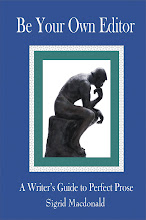This is
a tricky one. I almost always got this wrong when I was young and most of the
time I still deliberately misspeak because I don't want to sound uptight, but
the correct answer is counterintuitive. Most of us want to say, "I
appreciate you considering the matter" because we view this sentence just
the way we view "I appreciate your consideration," but they are
completely different. Why?
Because
the latter, "I appreciate your consideration," emphasizes the term
consideration. That's what I appreciate. Your consideration. But when I say,
"I appreciate you considering the matter," I could be talking about
one of two things – I could mean that I appreciate you and then the
emphasis is on you, or I could mean that I appreciate you considering,
in which case the focus is on the term considering.
So, if
I' m focusing on you, it is technically correct to say, "I appreciate you
considering the matter." But most of the time, what people mean is that
they appreciate the considering, so the right way to say that would be, "I
appreciate your considering the matter." It sounds stiff and
formal, and because many grammarians consider both to be correct because they
mean separate things, I wouldn't worry too much about it if you get it wrong.

